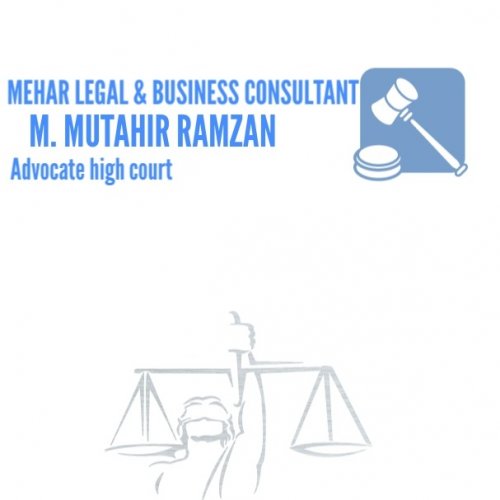Best General Litigation Lawyers in Gujranwala
Share your needs with us, get contacted by law firms.
Free. Takes 2 min.
List of the best lawyers in Gujranwala, Pakistan
About Litigation Law in Gujranwala, Pakistan
Guaranwala, like the rest of Pakistan operates under the common law system inherited from British colonisation. Litigation is a legal proceeding conducted by two opposing parties to enforce or defend a legal right. The litigation process includes trials, hearings, arbitration, mediation and pre-trial negotiations. It follows a set of established procedures laid down in the Code of Civil Procedure 1908 and the Civil Courts Ordinance 1962. Like in other Pakistani jurisdictions, legal practitioners in Gujranwala can represent their clients in various local, district and high courts, depending on the nature of the dispute.
Why You May Need a Lawyer
Engaging a lawyer could be necessary in several instances such as disputes related to properties, businesses, financial matters, personal issues like divorce or custody battles, and criminal offenses. Professional legal guidance can help navigate complex procedural issues, avoid unnecessary delay and ensure that your rights and interests are represented to the best extent. Additionally, lawyers can play a pivotal role in preventing litigation by providing timely advice on potential disputes.
Local Laws Overview
At the foundation of local litigation in Gujranwala lies the Constitution of Pakistan, which provides the principal laws governing civil and criminal cases. Matters like property disputes, construction disputes, and tenant eviction cases are primarily governed by the provincial laws such as The Punjab Rented Premises Act, 2009. Furthermore, family and personal matters are governed by the Family Courts Act, 1964 and the Muslim Family Laws Ordinance, 1961. It can be complex for a layperson to understand these legal nuances, thus, having a professional guide through the process is crucial.
Frequently Asked Questions
1. How long does a litigation process take in Gujranwala?
The length of litigation can vary significantly depending on the nature of the case, the parties involved and the workload of the courts. However, on average, a case can take anywhere between a few months to several years.
2. Can I represent myself in court?
Yes, individuals are legally allowed to represent themselves in court. However, legal procedures can be complex, time-consuming and stressful, thus professional legal representation is always advisable.
3. How can I find a good litigation lawyer in Gujranwala?
The Punjab Bar Council is a reliable resource where you can obtain listings of registered lawyers practicing in Gujranwala. Recommendations are also a good method to find reputable lawyers.
4. What is the usual fee structure for a litigation lawyer?
Typically, a lawyer's fees may be structured as fixed, hourly, per appearance, or contingent upon the case’s outcome. This would depend on the lawyer's discretion and the nature of your case.
5. Can I appeal if I am unhappy with the court's decision?
Yes, the losing party has the right to appeal the decision with a higher court. The time frame to appeal is usually limited, and you should seek immediate legal advice if you wish to appeal.
Additional Resources
The Punjab Bar Council and the High Court Bar Associations of the province are valuable resources for those seeking legal advice. The Ministry of Law and Justice, Pakistan also provides useful legal information and resources online. Libraries and online portals like PAKLII provide access to Pakistani statutes, rules and case law.
Next Steps
If you require legal assistance in Gujranwala, start by identifying a few potential lawyers who specialize in the area of law related to your case. Schedule consultations to discuss your case and assess the lawyer's expertise. It's essential to clarify fees, timelines, and the procedures involved in your case. Once you choose your lawyer, ensure to maintain clear communication and cooperation throughout the litigation process.
Lawzana helps you find the best lawyers and law firms in Gujranwala through a curated and pre-screened list of qualified legal professionals. Our platform offers rankings and detailed profiles of attorneys and law firms, allowing you to compare based on practice areas, including General Litigation, experience, and client feedback.
Each profile includes a description of the firm's areas of practice, client reviews, team members and partners, year of establishment, spoken languages, office locations, contact information, social media presence, and any published articles or resources. Most firms on our platform speak English and are experienced in both local and international legal matters.
Get a quote from top-rated law firms in Gujranwala, Pakistan — quickly, securely, and without unnecessary hassle.
Disclaimer:
The information provided on this page is for general informational purposes only and does not constitute legal advice. While we strive to ensure the accuracy and relevance of the content, legal information may change over time, and interpretations of the law can vary. You should always consult with a qualified legal professional for advice specific to your situation.
We disclaim all liability for actions taken or not taken based on the content of this page. If you believe any information is incorrect or outdated, please contact us, and we will review and update it where appropriate.









